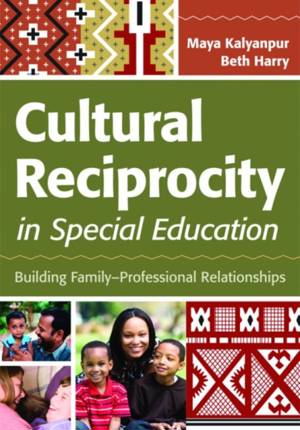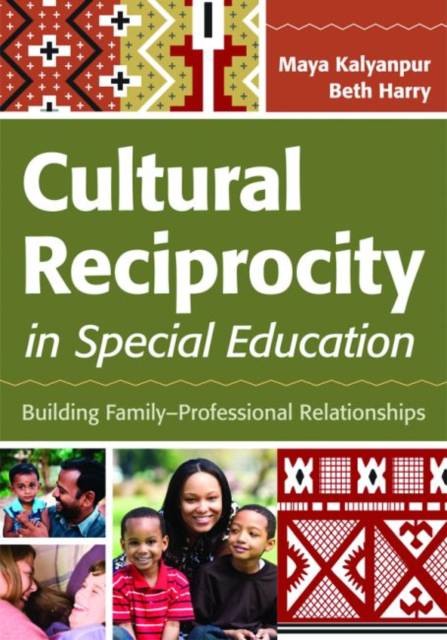
- Retrait gratuit dans votre magasin Club
- 7.000.000 titres dans notre catalogue
- Payer en toute sécurité
- Toujours un magasin près de chez vous
- Retrait gratuit dans votre magasin Club
- 7.000.0000 titres dans notre catalogue
- Payer en toute sécurité
- Toujours un magasin près de chez vous
Cultural Reciprocity in Special Education
Building Family?professional Relationships
Maya Kalyanpur, Beth HarryDescription
To succeed in increasingly diverse classrooms, tomorrow's special educators need explicit training on working effectively with all families. Prepare the next generation of teachers with this accessible text, developed by two highly respected experts on cultural and linguistic diversity and inclusive education.
Ideal for use as a supplementary textbook in a wide range of courses related to special education, this book gives educators a practical framework for cultural reciprocity--a process that helps professionals and families examine their own values, respect each other's differences, and collaborate skillfully to benefit children.
Educators will learn how to- strengthen awareness of their own cultural identities and roles
- explore how their values and beliefs might affect interactions with families
- sidestep stereotypes by treating each family and situation as unique
- ensure successful IEP meetings through effective cross-cultural communication
- avoid "right versus wrong" assumptions about parenting styles and practices
- understand how diverse families might view key special education goals--independence, individuality, and work
- combine ideas from different value systems to arrive at solutions that work for everyone
- challenge the ways in which mainstream culture shapes special education policies and practices
The authors draw on their own experiences and research to describe applications of cultural reciprocity, including reader-friendly textboxes and memorable personal anecdotes.
To give special educators a deeper, more nuanced understanding of cultural reciprocity, the text also includes three chapter-long case studies that further illustrate the process at work. Readers will learn from the challenges and successes of an African American researcher working with a group of teenage mothers; two teacher educators collaborating on the Special Educators Entering a Diverse Society (SEEDS) project; and an Asian Indian teacher educator leading a class of mostly Caucasian students.
A key text for future special educators--and a valuable resource for inservice training--this book will help teachers build strong collaborative relationships with diverse families and ensure that all children receive the best possible education.
Spécifications
Parties prenantes
- Auteur(s) :
- Editeur:
Contenu
- Nombre de pages :
- 216
- Langue:
- Anglais
Caractéristiques
- EAN:
- 9781598572315
- Date de parution :
- 13-06-12
- Format:
- Livre broché
- Format numérique:
- Trade paperback (VS)
- Dimensions :
- 178 mm x 254 mm
- Poids :
- 376 g

Les avis
Nous publions uniquement les avis qui respectent les conditions requises. Consultez nos conditions pour les avis.






